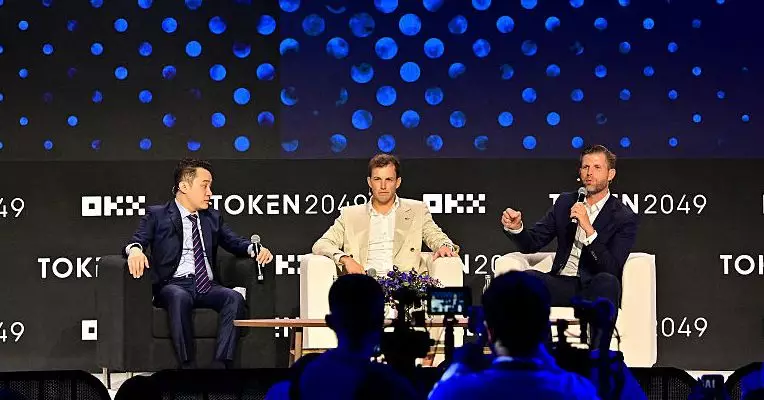World Liberty Financial is carving its niche in the tumultuous world of cryptocurrency, with its owners drawing attention that goes beyond mere business interests. At the helm of this venture is Eric Trump, son of former U.S. President Donald Trump, who recently made headlines by presenting at the high-profile Token2049 conference in Dubai. Eric was not alone; he was joined by Zachary Witkoff, cofounder of World Liberty Financial and son of Steve Witkoff, a prominent White House envoy. This familial constellation raises eyebrows, presenting a vivid illustration of the intertwining of politics and entrepreneurial ventures.
At stake is the promotion of USD1, a stablecoin introduced by World Liberty Financial. The ambition is underscored by a major financial operation involving MGX, a UAE-based investment firm. The plan is for MGX to funnel a whopping $2 billion investment into Binance, the world’s leading cryptocurrency exchange, with World Liberty Financial skillfully orchestrating this intricate dance. The convergence of interests—political, financial, and ethical—creates a potent mix that could have significant implications for both American democracy and the global cryptocurrency market.
The Mechanics of a Stablecoin and Its Financial Ramifications
Stablecoins are designed to minimize price volatility, making them appealing for investors who seek less risk than traditional cryptocurrencies, which can fluctuate dramatically in value. USD1 ties its worth to the U.S. dollar through a reserve of cash and other assets. This clever construction allows for stability in trading; when customers trade USD1 in the market, they effectively exchange it for real U.S. dollars held in reserve.
The economic mechanics behind this are fascinating. When new USD1 coins are issued, World Liberty Financial receives an equal amount of U.S. dollars, some of which gets retained in liquid assets while the rest is typically invested in U.S. government bonds. At the current interest rates, this could translate into significant revenue—an estimated $85 million annually if the $2 billion investment in Treasuries plays out as planned.
However, while the financial calculus shows immense potential profits, the real question isn’t just about monetary gain. It’s about the overlapping relationships at play and the ethical implications of those ties. As the Trumps stand to gain from this enterprise, so does the surrounding network of international investors—enter MGX with deep UAE financial backing. This complex ecosystem feeds accusations of potential corruption and ethical dilemmas.
The Ethical Quagmire: Influence and Power Dynamics
The specter of conflicts of interest looms large over World Liberty Financial’s operations. Critics argue that the transactions concerning USD1 could covertly empower foreign entities, enabling them to curry favor with the former president and his family. George Selgin, a prominent economist, articulately voiced this sentiment, denouncing the arrangement as one reeking of “influence peddling.” It’s a sentiment that resonates outside the echo chambers of political affiliates, presenting a serious questioning of ethical standards.
This situation isn’t merely about individual financial gain but rather about the broader implications of such a setup on U.S. governance and foreign relations. When businesses with substantial foreign ties intersect with the interests of powerful political families, the potential for corruption and clandestine dealings becomes markedly pronounced. It raises vital questions about accountability, transparency, and the ultimate power dynamics governing such transactions.
The convergence of politics, finance, and cryptocurrency in this context gives rise to new ethical considerations and moral dilemmas that society must confront. With the cryptocurrency industry growing by leaps and bounds, how will the regulatory environment adapt to ensure that conflict-of-interest scenarios such as this do not become the norm rather than the exception?
The narrative surrounding World Liberty Financial and the USD1 stablecoin presents a cautionary tale—a modern parable about how money, power, and influence can intertwine in ways that challenge the very fabric of democratic institutions. As traditional boundaries blur and new financial landscapes emerge, maintaining integrity within this cauldron of interests will undoubtedly prove one of the pressing challenges of our time.

